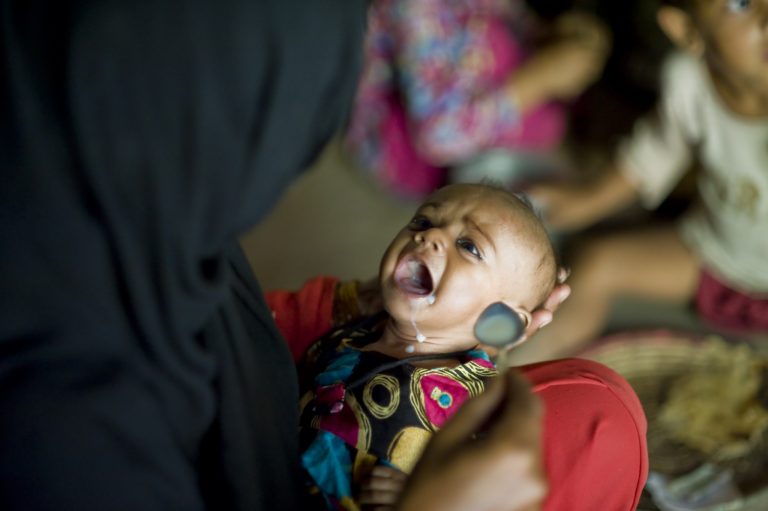According to the Pakistan Demographic Health Survey of 2012-13, 38 percent of children under 6 months are exclusively breastfed, and the median duration of exclusive breastfeeding is less than one month. Yet neonatal deaths could be reduced by 22 percent by ensuring early initiation of breastfeeding within one hour of delivery and by 16 percent if started within 24 hours after delivery.
A survey conducted by Gallup Pakistan across four provinces in 2012 revealed that 84 percent of mothers said they had been advised to use formula milk or other milk or drinks or food for infants under 6 months of age, and almost half had been advised by healthcare providers to use formula milk. The most alarming observation was that a quarter of mothers were recommended a particular brand of infant formula. In some cases, the name of the product was included in the information material available at the health facility. These are all clear violations of the International Code of Marketing of Breastmilk Substitutes.
The problem is that Pakistan’s legislation on the sale of formula milk and other breastmilk substitutes (the Protection of Breastfeeding and Child Nutrition Ordinance, 2002) has not been fully implemented. Pakistan is one of the 118 countries that voted in favour of adoption of International Code at the World Health Assembly in 1981. But despite these steps, the sale of formula milk has increased in Punjab. Over-the-counter sale of formula milk is increasing, thereby discouraging exclusive breastfeeding from birth until 6 months.
After the devolution to the provinces for the responsibility to implement Pakistan’s law, the Government of Punjab enacted The Protection of Breastfeeding and Child Nutrition (Amendment) Act 2012. Two years later, the Punjab Infant Feeding Board (PIFB) met and established a small group of technical persons to review the rules in detail and gather suggestions. This group proposed draft rules in July 2014. In December 2016, the Government of Punjab Department of Health issued the Rules of the Protection of Breastfeeding and Child Nutrition Act 2012 but yet no implementation of legislation seen on ground.
It is pertinent to note that neither newborns nor early initiation of breastfeeding have been mentioned specifically in the deliverables of the PIFB. My opinion, however, is that the PIFB should be charged with advising the Government how to amend the legislation to ensure that early initiation of breastfeeding is implemented at all public and private health facilities so that we can meet our obligation to save newborn lives.
The early initiation of breastfeeding within first hour of delivery must be ensured at all public and private health facilities. We need to set and monitor targets with requirements that health facilities enact early initiation of breastfeeding, educate doctors and nurses attending childbirth, implement campaigns warning of the dangers of prelacteal feeds, and guarantee access to breastmilk for every newborn. A separate room must be dedicated at all public and private offices for mothers to breastfeed their newborns without affecting their official routine and days off from work.
The Policy and Strategic Planning Unit of Department of Health Punjab has developed a comprehensive Multisectoral Nutrition Strategy, but we have to ensure its important role in combating malnutrition is not ignored. The Provincial Government should empower the newly structured District Health Authorities/Local Health Councils all across Punjab to ensure implementation of the Multisectoral Nutrition Strategy through a community-based, citizen-led approach, facilitating the PIFB to discourage use of formula milk and encourage exclusive breastfeeding from 0 to 6 months.
One newborn is dying every minute. We anticipate that implementation of Protection of Breastfeeding and Child Nutrition act 2012 would be helpful in decreasing Neonatal Mortality in Punjab.
Blog by Naveed Jafri, Community Empowerment Manager, Palladium Pakistan
